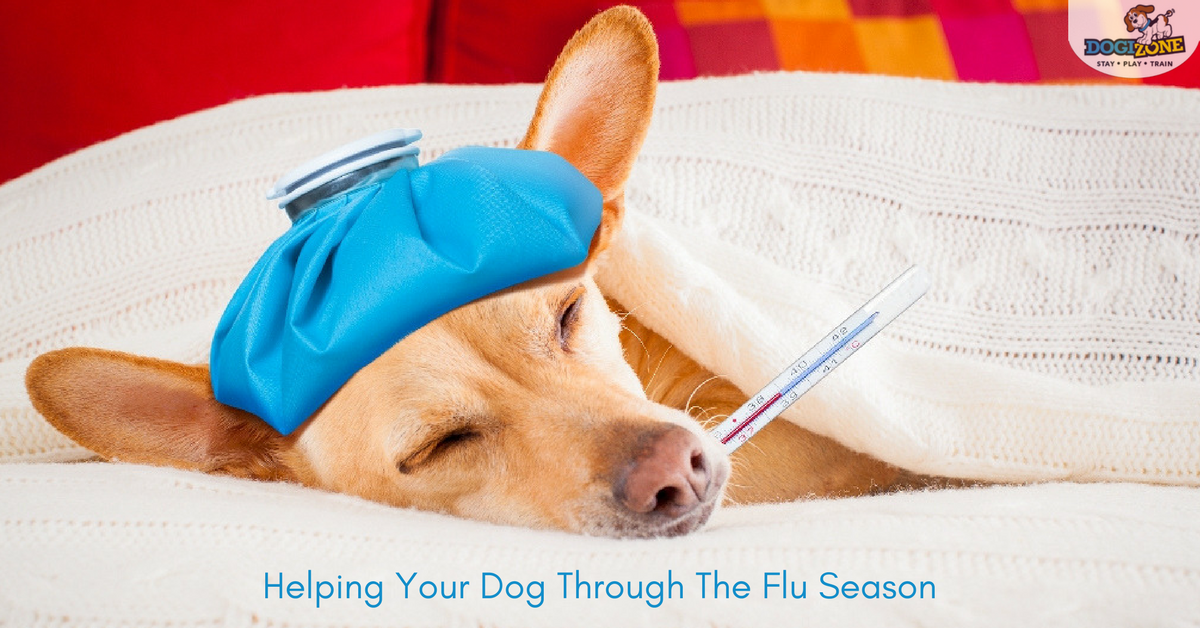Helping Your Dog Through The Flu Season
Flu Season Can Affect Dogs Too!

When it comes to dogs and the flu, there are some important things that owners need to realize. There is a common myth that humans can get flu from their dogs—this is simply not true. Canine influenza is an H3N2 strain of flu first identified in 2015, but it is not the same stain of flu that is affecting people. So, just to clarify, you cannot get influenza from a dog. But when it comes to helping your dog during flu season, we have you covered.
On the other hand, your dog can contract the flu from people in their life. This is also true for cats. According to Dr. Amy Glaser of the Cornell Molecular Diagnostics Animal Health Diagnostics Center, sick adults or kids with the flu should try to avoid contact with their pets to prevent the risk of infection.
The Dog Flu
Canine influenza can, of course, be transferred between dogs as they interact. Like the human flu, direct contact between healthy dogs and sick dogs is the common form of transmission. Sneezes and coughing can also spray flu germs a long distance.
Dogs that are most commonly seen as at risk for coming in contact with other sick dogs are those that are kenneled or those that spend time in dog parks. However, dog daycare facilities, training classes, or even walking in the neighborhood with other pets and their owners can be a potential place for a dog to come in contact with the flu. This is why we highly recommend that all dogs have an updated canine influenza vaccine before coming to our facility.
The Symptoms
The most common signs of flu in a dog are often confused for seasonal allergies. They include sneezing and coughing, runny eyes, and decreased energy levels. Many dogs also have a significant drop in appetite that may last a few days to two to three weeks.
Some dogs will have very limited symptoms, and just how long pre and post symptoms the dog is a carrier of the flu is not clearly understood. The good news is that this is not a serious condition for most healthy adult dogs. There is a less than 10% fatality rate for dogs with canine influenza, with the highest rates for senior dogs, young puppies, and dogs with preexisting health issues.
The Options
There is a vaccine that your vet can provide to help your dog through the flu season. For dogs that are kenneled, taken to shows or competitions, around a lot of other dogs, or that routinely go to the dog park this is an option to discuss with your vet.
The vaccine will not prevent the dog from getting the flu, but it can be helpful in reducing the symptoms and shortening the course of the disease. If your dog has the flu, the vet may prescribe additional medications as well as recommend fluids to address issues with dehydration or secondary types of infections. Never give a dog any human medications, even herbal supplements, as they can be fatal.
Additionally, while your dog has the symptoms and for 21 days after, keep the dog in a private area and away from other pets. Do not allow pets to share food or water dishes during this time. Be sure to use regular hygiene practices after interacting with the dog, and wash your hands thoroughly to prevent any transmission of the germs to other animals in your home. Also be sure you’re taking care of your dog’s health starting with a healthy diet. Our partner Bark! will ensure you’re taken care of with the best food and supplements that support wellness.

